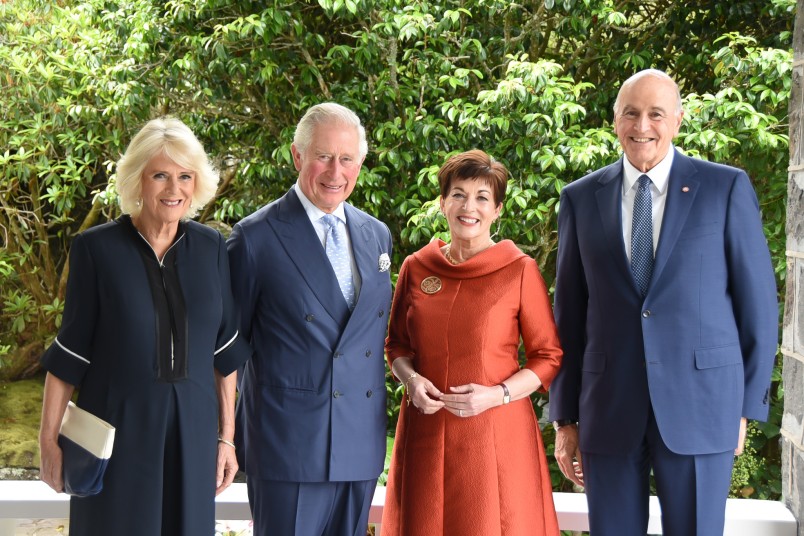Reception for the Prince of Wales and the Duchess of Cornwall

With Dame Patsy Reddy and Sir David Gascoigne during their 2019 visit to New Zealand
E te Tihi Whatukura, e te mareikura, tena korua.Nau mai ki Aotearoa.Haria mai o mana tiketike hei manaakitanga mai.E te whakaminenga tena koutou katoa.
To Your Royal Highnesses, my greetings. Welcome to Aotearoa.
Your esteemed Authority brings a special embrace to this land.My greeting to you all gathered here.
Your Royal Highnesses, it has been a great pleasure to host you here at Government House Auckland today.
This morning you were officially welcomed on the Mappin Lawn and this afternoon I was delighted to join the Duchess of Cornwall for a function introducing the Women of the World Foundation to a group of New Zealand women.
On this, your third joint visit to Aotearoa New Zealand, I am confident that you will see a new momentum in our work to address issues that I know are dear to your hearts.
New Zealand is sometimes described as being at the end of the world, and, as you both well know, it can certainly feel like that after a long-haul flight from the northern hemisphere.
But there are advantages, especially when we see the extreme forces buffeting other parts of the world.
As the last major land mass to be settled by humans, these islands represent the very culmination of the human migration process that started in the horn of Africa, about 60,000 years ago.
So in addition to being a relatively new country in geological terms, we are also new in human terms. We have the capacity to be nimble and flexible, drawing on different knowledge systems, histories and traditions, to create our own way forward.
This year, our Tuia 250 commemorations have focussed on the history of settlement in Aotearoa New Zealand.
We have recalled the feats of the intrepid Polynesian seafarers whose navigational skills took them to the length and breadth of the vast Pacific Ocean, and finally here to Aotearoa, some 800 years ago.
We have celebrated and embraced anew our kinship ties with our Polynesian cousins, and strengthened our resolve to represent the interests of small island nations on the world stage.
And we have marked 250 years since the arrival of Captain James Cook and his crew on the Endeavour.
The word ‘Tuia’ alludes to the weaving together of the different threads of our history that came together at that point.
Tuia 250 has prompted us to look at past wrongs and have frank conversations about the rebalancing of our history books.
It aligns with a renewed interest and pride in pre-European history – here and in the Pacific – and closer examination of the impact of European arrival on our shores.
It is in this context that the British government’s expression of regret about the deaths of Māori at the hands of the Endeavour’s crew was delivered in Turanganui-a-Kiwa last month by Her Excellency Laura Clarke, the British High Commissioner. It was a significant moment in our history, and was warmly received.
Tuia 250 has, in its own way, inspired our guest list for this evening’s reception.
We have brought together people with diverse backgrounds, talents, skills, and areas of interest. The fabric of New Zealand is made stronger by the threads of their activities.
Some of our guests are driving real change in the way we approach our environment, the wellbeing of our flora and fauna, the quality of our soil and water, the reduction of waste, and our ability to live sustainably.
They are building bridges between academia, the public sector, iwi, NGOs, the corporate world and enthusiastic community groups – to turbo-charge our responses to the climate crisis and environmental degradation.
The broad consensus that has been achieved about climate science was reflected in our Zero Carbon Act, to which I gave royal assent last week.
There’s another group of guests here whose extraordinary gifts and achievements make us gasp with delight and astonishment and give us pride in our culture, whether it’s in the field of sport, their grasp of words and ideas, or their talents in music and art.
Others here work in areas that foster and promote a more tolerant, compassionate and connected nation. Their work has particular resonance in the wake of the terrorist attack in Christchurch. We have all engaged in soul-searching about how New Zealand can be more inclusive and supportive of our citizens, whatever their background.
In the past, New Zealand has been a great social incubator, introducing ground-breaking reforms, so we know that we have the capacity to change and do better.
In this year when we have been challenged in ways that we could not have imagined, we have understood the urgent need for action, to work together for public good.
There are hopeful indicators of steady and continuous change for the better. In this interconnected world of the 21st century, that is not only good for our nation, but also for the wider world.
Your Royal Highnesses, thank you for you interest in and enthusiasm for Aotearoa New Zealand.
I hope you enjoy the evening.
Kia ora tatou katoa.
I now invite the incomparable Simon ONeill, who has been described as the Wagnerian tenor of his generation, but whose range and repertoire is so much wider, to sing an aria, for us. He is accompanied by the Wellington Trio D’Anches.
